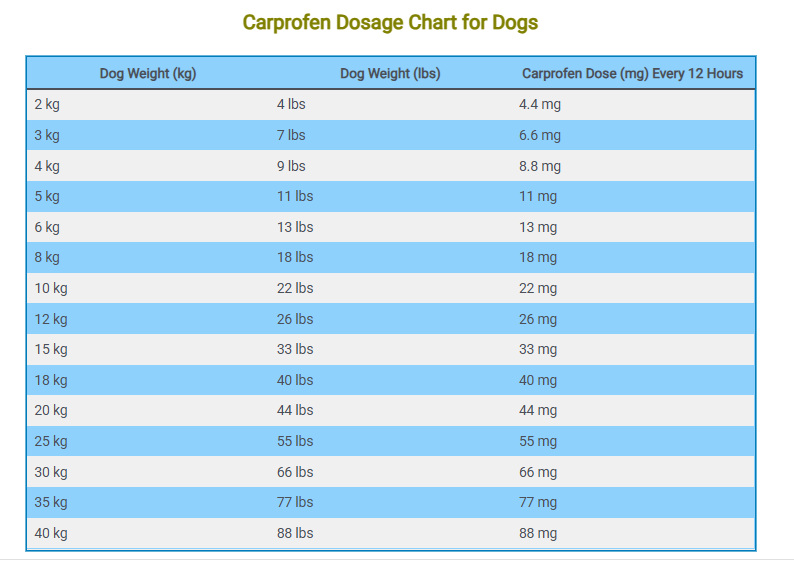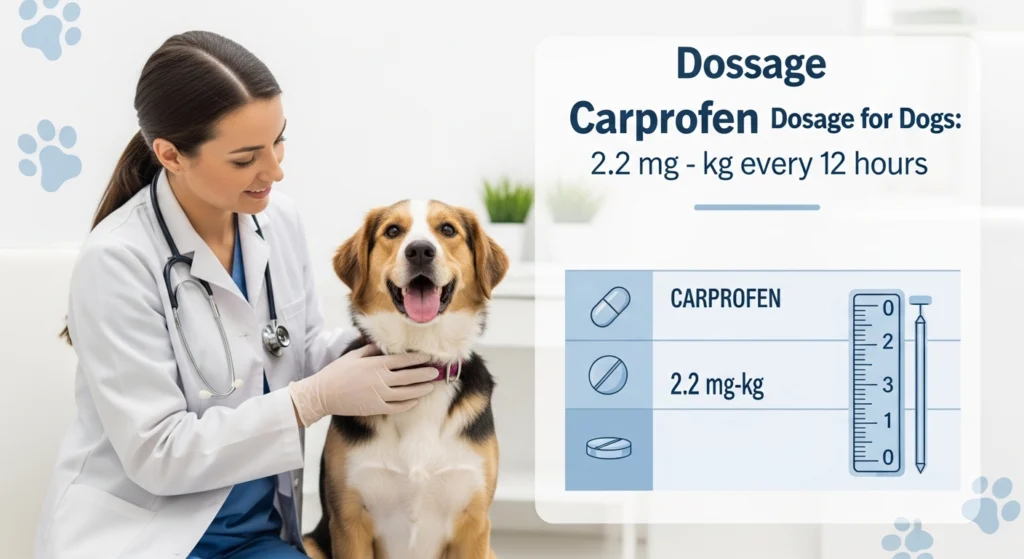Carprofen is one of the most commonly prescribed medications for dogs dealing with pain, inflammation, arthritis, and post-surgery recovery. If your dog has been limping, struggling to stand, or recovering from an operation, there’s a good chance your veterinarian has mentioned Carprofen. While it’s highly effective, the most important part of using it safely is giving the correct dosage based on your dog’s weight.
A little too much can lead to serious side effects, and too little may not provide any relief at all. That’s why understanding how Carprofen works, how much to give, and how to monitor your dog is absolutely essential.
Key Takeaways
- Carprofen is an NSAID (non-steroidal anti-inflammatory drug) specifically developed for dogs
- The typical dosage is 2.2 mg per pound of body weight given once daily
- Always follow your veterinarian’s specific dosing instructions
- Never give Carprofen without veterinary consultation and prescription
- Watch for side effects like vomiting, diarrhea, or changes in behavior
- Proper storage and administration are essential for medication safety
This article is for informational purposes only and does not replace professional veterinary advice. Always consult with your veterinarian before starting, changing, or stopping any medication for your pet.
Carprofen Dosage for Dogs
The recommended Carprofen dosage for dogs is 2.2 mg per kg of body weight every 12 hours, given orally (PO). This dosing helps relieve pain and inflammation caused by arthritis, hip dysplasia, or post-surgery recovery. Always calculate the dose based on your dog’s exact weight and follow your veterinarian’s instructions, as giving too much Carprofen can lead to serious side effects like stomach ulcers or liver damage.
Carprofen Dosage Chart for Dogs
| Dog Weight (kg) | Dog Weight (lbs) | Carprofen Dose (mg) Every 12 Hours |
|---|---|---|
| 2 kg | 4 lbs | 4.4 mg |
| 3 kg | 7 lbs | 6.6 mg |
| 4 kg | 9 lbs | 8.8 mg |
| 5 kg | 11 lbs | 11 mg |
| 6 kg | 13 lbs | 13 mg |
| 8 kg | 18 lbs | 18 mg |
| 10 kg | 22 lbs | 22 mg |
| 12 kg | 26 lbs | 26 mg |
| 15 kg | 33 lbs | 33 mg |
| 18 kg | 40 lbs | 40 mg |
| 20 kg | 44 lbs | 44 mg |
| 25 kg | 55 lbs | 55 mg |
| 30 kg | 66 lbs | 66 mg |
| 35 kg | 77 lbs | 77 mg |
| 40 kg | 88 lbs | 88 mg |
Carprofen For Dogs Brand Names
-
Rimadyl®
-
Zinecarp®
-
Canidryl®
-
Aventicarp®
-
Rycarfa®
-
Rimifin®
-
Carpox®
-
Tergive®
-
Carprodyl®
-
Carprieve®
-
Norocarp®
-
Novox®
-
quellin®
-
Rovera®
-
Vetprofen®
-
Levafen®)
Benefits of Carprofen for Canine Pain Management
Veterinarians commonly prescribe Carprofen for several conditions that cause pain and inflammation in dogs:
- Osteoarthritis and joint pain
- Post-surgical pain management
- Hip dysplasia discomfort
- Soft tissue injuries
- Other inflammatory conditions
The effectiveness of Carprofen in improving mobility and quality of life for dogs with chronic pain has been well-documented in veterinary studies. Many dog owners report significant improvement in their pets’ activity levels and overall comfort when properly administered.
Important Safety Considerations
Before administering Carprofen to your dog, it’s essential to understand these important safety considerations:
- Veterinary Prescription Required: Carprofen should only be given under veterinary supervision. Never administer this medication without consulting your veterinarian first.
- Medical History Matters: Inform your veterinarian about any existing health conditions, especially kidney or liver disease, bleeding disorders, or previous adverse reactions to NSAIDs.
- Pre-treatment Screening: Many veterinarians recommend blood work before starting Carprofen to establish baseline organ function values.
- Regular Monitoring: Long-term use of Carprofen requires periodic monitoring through physical examinations and blood tests to check for potential side effects.
- Storage: Store Carprofen at room temperature, away from moisture and heat, and out of reach of children and pets.
Carprofen Side Effects For Dogs
While Carprofen is generally safe when prescribed and administered correctly, like all medications, it can cause side effects. The most common side effects include:
- Gastrointestinal upset (vomiting, diarrhea, loss of appetite)
- Lethargy or depression
- Changes in drinking or urination habits
- Behavioral changes
- Skin reactions (redness, scabs, or itching)
More serious but less common side effects may include:
- Stomach or intestinal ulcers
- Liver or kidney problems
- Bleeding disorders
- Seizures
If you notice any unusual symptoms after starting Carprofen, contact your veterinarian immediately.
Signs of Carprofen Overdose
Accidental overdose can occur if a dog ingests too much Carprofen. Signs of overdose may include:
- Severe vomiting and diarrhea (possibly with blood)
- Extreme lethargy or collapse
- Pale gums
- Increased thirst and urination
- Stumbling or lack of coordination
- Seizures
If you suspect an overdose, seek emergency veterinary care immediately. Treatment may include induced vomiting, activated charcoal administration, intravenous fluids, and supportive care.
Drug Interactions to Be Aware Of
Carprofen may interact with other medications your dog is taking. Inform your veterinarian about all medications, supplements, or herbal products your dog receives, especially:
- Other NSAIDs (aspirin, etodolac, meloxicam)
- Corticosteroids (prednisone, dexamethasone)
- ACE inhibitors (enalapril, benazepril)
- Certain antibiotics
- Phenobarbital
- Warfarin or other anticoagulants
- Methotrexate
Alternatives to Carprofen for Pain Relief
While Carprofen is effective for many dogs, some pets may not tolerate it well or may have conditions that make its use inadvisable. Alternatives include:
- Other veterinary NSAIDs (meloxicam, deracoxib, firocoxib)
- Joint supplements containing glucosamine and chondroitin
- Omega-3 fatty acid supplements
- Physical therapy and rehabilitation
- Acupuncture
- Weight management programs
- Prescription therapeutic diets
- Alternative pain management medications (gabapentin, tramadol)
Read More About:
FAQs
How quickly does Carprofen work in dogs?
Carprofen typically begins to take effect within 1-2 hours of administration, with maximum pain relief often observed after 3-5 days of consistent use.
Can I give my dog Carprofen with food?
Yes, administering Carprofen with food can help reduce the risk of gastrointestinal upset. However, always follow your veterinarian’s specific instructions regarding administration.
How long can my dog stay on Carprofen?
The duration of Carprofen treatment depends on the condition being treated. For acute pain, it may be prescribed for just a few days to weeks. For chronic conditions like arthritis, it may be used long-term with regular veterinary monitoring.
Is Carprofen safe for all breeds?
While generally safe for most breeds, some breeds may be more sensitive to NSAIDs. Always discuss breed-specific considerations with your veterinarian.
Can I give my dog human NSAIDs instead of Carprofen?
No. Human NSAIDs like ibuprofen and naproxen can be toxic to dogs and should never be given as a substitute for veterinary medications.
What should I do if I miss a dose?
If you miss a dose, give it as soon as you remember. However, if it’s close to the time for the next dose, skip the missed one and return to the regular schedule. Never double up on doses.
Final Thoughts
Carprofen for dogs can significantly improve the quality of life for dogs suffering from pain and inflammation. When used appropriately under veterinary guidance, it’s a safe and effective medication. Remember that every dog is unique, and what works for one may not be suitable for another.
Always work closely with your veterinarian to determine the appropriate Carprofen dosage for your dog, monitor for side effects, and evaluate the ongoing need for the medication. With proper care and attention, Carprofen can help your furry friend enjoy a more comfortable, active life.










